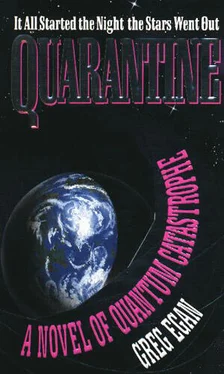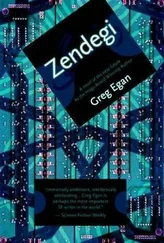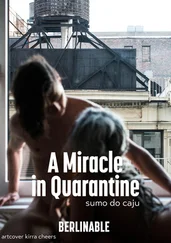I start to put the lock down — nobody's forcing me to go through with this — but then I think: That's the very worst thing I can do. My smeared self is going to choose someone who opens the lock, not someone who abandons the whole experiment. If I give up, my chances of surviving are zero.
I stare at the lock, and try to psych myself out of these absurd fears. I've smeared before, and come through. Yes, of course I have — or I wouldn't be here at all. That says nothing about my situation now. I shake my head. This is ludicrous. Everybody collapses. What do I think — everyday life is founded on a process of constant genocide? If I couldn't swallow that for hypothetical aliens, why should I swallow it for human beings?
Hypothetical aliens? Who do I think made The Bubble?
So… what am I going to do? Sit here and wait for Lee to turn up and take the decision out of my hands? Or do I plan to find a way to spend the rest of my life unobserved? But even that wouldn't save me: when the chosen version of me chooses to collapse, I'll vanish — unless I am the chosen version … and the odds against that are worse than ten billion to one.
I don't know what breaks the spell, but suddenly — mercifully — I'm sceptical again. Part of me muses: // quadrillions of virtual humans really are dying every second, then death is nothing to fear. It's a purely intellectual observation, though; I don't believe I'm going to die. I raise the lock and hit ten keys without thinking, almost without looking, then I stare at the tiny display above the keypad: 1450045409.
Too orderly? Too random?
Too late. I tug the ring.
Lui stands by the central pond in KowloonPark, throwing bread to the ducks. I think he's seen too many bad spy movies. He doesn't even glance my way when I'm standing right beside him.
I say, "There's not much point pretending you don't know me; I think our employer might already be aware of the fact.' He ignores that. 'What happened last night?'
'Success.'
'On the first try?'
'Yes, on the first try. ' I glance down at the pond, and try to decide if I want to kill him or embrace him.
After a moment, I say, 'It was a good idea. The padlock. It was torture — for five minutes — but I have to admit that in the end it was worth it.' I laugh, or I try to — it doesn't sound at all convincing. 'I tell you, when that fucking thing sprang open, I'd never been so happy in my life. I almost died from sheer relief. And… there's no logic to this, I know, but… nothing could have made me more confident that whatever happens now, I will come through.'
He nods solemnly. 'Operating the mod isn't the challenge. The challenge is learning how to think about it. You have to find a frame of mind which lets you pass through these situations, untroubled. We can't have you succumbing to metaphysical terror in the middle of your raid on BDI.'
'No.' I laugh again, more successfully this time. 'Mind you, I don't think I'll find many locks in BDI with such easy combinations. Ten nines, in real life? Hardly.'
Lui shakes his head. 'Easy combinations? What does that mean? For you, they're all easy, now.'
It takes me another week to master locks that ought to need keys. Lui shows me his calculations: the odds against a few quantum-dot transistors in a lock's microchip spontaneously obliging me with all the right malfunctions are no worse than the odds against one hundred consecutive snake's eyes. The fact that neither event would normally be expected to occur in the entire history of the universe (if such a time scale can be so glibly invoked, when it's likely that nothing at all Occurred' — in the human sense — for most of that history) is beside the point. The point is, I've convinced myself that it can be done — and the smeared Nick Stavrianos seems to find that helpful.
Security cameras still worry me, though.
'If I'm observed, I'm collapsed. Collapsed at random, by whoever's watching the monitor.'
Lui says, 'Not at random. You still have control of the eigenstate mod. And not collapsed — not if you make the probability small enough. You don't collapse yourself when you don't want to, do you? Even though that's certainly a possible event. Stop thinking of your smeared self as this fragile, defenceless, precarious system which can't survive a single glance.'
'But one glance will destroy — '
No. Can, not will. One glance can collapse you, certainly. And dice can fall in all kinds of ways — but they don't, if you don't let them. Observation, in itself, doesn't collapse the wave. You don't become blind when you smear, do you? The collapse is a distinct process. If someone observes you, the two wave functions interact — they become a single entity. That gives the observer the power to collapse you — but it also gives you the power to manipulate the observer and prevent the collapse.'
'So we battle for the fate of the wave function? Just when I've stopped worrying about struggling against all my own hypothetical selves, I have to face a tug-of-war for reality with someone who's indisputably as real as I am.'
'Think of it that way, if you like — but it won't be much of a competition. Your "opponents" won't even know what the wave function is, let alone have any capacity to manipulate it.'
'That hasn't stopped several billion people from collapsing it, a few thousand times a day.'
'Collapsing themselves, and inanimate objects, and other — equally ignorant, equally powerless — people. They've never faced anything like you.'
'People have faced Laura Andrews.'
Lui smiles. 'Exactly. And yet she still managed to break out of the Hilgemann twice, didn't she? What more proof do you need?'
The first night that I abandon my post, I remain on the level of Po-kwai's apartment, and confine myself to rooms and corridors that are — plausibly — deserted. I wander through the fields of a dozen cameras and motion detectors; my colleagues in the central security room should, at the very least, demand an immediate explanation, but no coded infrared message blasts down from the ceiling transceivers. Proving what? That I've 'caused' the cameras and sensors to malfunction discreetly? That I've 'made' the guards inattentive? Or that I've merely kept any sign that I've been observed from reaching me — that I've fended off the consequences until after the collapse?
I walk past the silent apartments of the other volunteers, wondering — jealously — if any of these people have begun to master Ensemble. Lui thinks not, but he can't be certain. I can live with my need for Po-kwai's unconscious intercession, but the thought of anyone else gaining access to the mysteries of the true Ensemble fills me with disgust. Nobody in the world shares the insight that the loyalty mod has granted me; only I have the right to travel this path. I hold this belief side by side with the knowledge that my ultimate aim is to deliver Ensemble to the Canon, but the contradiction seems superficial, an irrelevant abstraction.
I return to the anteroom, collapse — and wait to see if I've achieved invisibility, or mere ostrich-like self-deception. Could my smeared self tell the difference between states where I truly went unnoticed and states where I fooled nobody but myself? Which is the least probable: to walk past a camera unseen — or to distort my own memories and perceptions to convince myself that I've done so?
I don't know — but nobody arrives to accuse me of dereliction of duty. The hours pass as uneventfully as ever. Then again, maybe I'm already huddled, catatonic, in a corner of some basement prison cell, and tonight's apparent success is the product of nothing but my smeared self selection of a version of me with extraordinary hallucinatory skills. How can I rule that out? The fact that it's 'unlikely' no longer means anything at all. If I can succeed against spectacular odds, I can fail in the very same way.
Читать дальше










